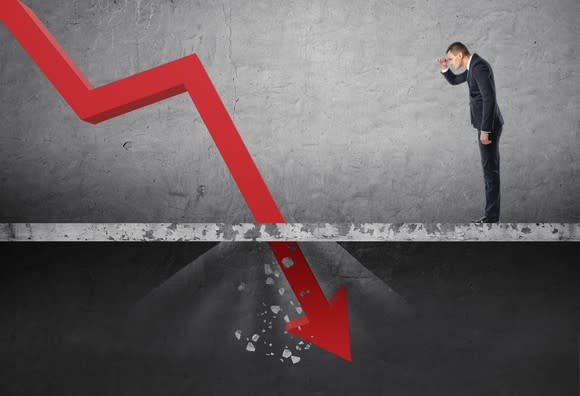3 Dividend Stocks With Better Yields Than Verizon
When it comes to investing in retirement, there's nothing quite so enticing as buying stocks with outsized dividend yields. If those payouts come from companies with strong and reliable business models, all the better.
Today, Verizon is surely one of those companies. With the highest market share for wireless subscription plans among all carriers in the United States, there's reason to believe the company's 4.6% yield is safe. But that doesn't mean there aren't others offering even more.
Below, three Motley Fool investors will tell you about stocks offering up even bigger paydays: Physicians Realty Trust (NYSE: DOC), Frontier Communications (NASDAQ: FTR), and Macy's (NYSE: M). But be careful: some are safe, while others could be dangerous traps.

Image source: Getty Images.
A 5.2% yield and lots of growth potential
Matt Frankel (Physicians Realty Trust): One of my favorite long-tailed market opportunities over the next few decades is healthcare real estate. And Physicians Realty Trust is a unique and potentially lucrative way to play it.
The company owns more than 250 healthcare properties, most of which are medical offices. The company's investment strategy is to leverage its relationships with physicians and healthcare systems to find unique and compelling opportunities. Most of the company's target properties originate from off-market opportunities, or are too small to attract the interest of the larger healthcare real estate investment trusts (REITs).
Why do I like healthcare real estate so much? For one thing, the U.S. population is aging rapidly. The senior-citizen population is expected to roughly double over the next 35 years, with especially strong growth expected during the 2020-2030 decade. This should create steadily growing demand for healthcare and the properties that facilitate it.
In addition, less than 15% of the current $1.1 trillion healthcare real estate market in the U.S. is REIT-owned, and this is especially true with Physicians Realty Trust's core property type of medical offices, much of which is owned by groups of physicians, private investors, and other entities. In addition to the anticipated market growth, there should be no shortage of room to expand within the current inventory, and Physicians Realty Trust's relationship-driven approach could give the company a big advantage.
Don't fall for this 25% dividend
Brian Stoffel (Frontier Communications): Before a few years ago, Frontier was a struggling landline provider in Connecticut, with hopes of providing internet connectivity to businesses. But that approach took a bold turn when the company decided to buy assets from some of telecoms biggest players and provide cable and internet services in Texas, Florida, California, and Connecticut.
The results of that move have been disastrous. Frontier earned horrible grades for customer service in taking over these accounts, and customers began cutting the cord almost immediately. That left Frontier with a boatload of debt and limited options for paying out its dividend. That's why the payout was cut earlier this year. What's astounding is that the 25% yield is for a reduced payout!

Image source: Getty Images.
Besides the fact that Frontier's business is eroding quickly, it also has an ugly balance sheet. Currently, it has $286 million in cash on hand versus a whopping $17.6 billion in long-term debt. You might be comforted by the fact that Frontier brought in $682 million in free cash flow last year -- enough so that the new dividend would eat up just 60% of that pot.
But that would be a mistake: The debt obligations are enormous, and as the company continues to bleed customers, the free cash flow situation will further deteriorate. There's a reason the company has such a high dividend: It's in deep trouble. Don't be fooled by the big payout.
A high-yield mixed bag
Tim Green (Macy's): Department-store chain Macy's sports a 6% dividend yield, making Verizon's payout look paltry in comparison. This high yield is the result of a stock implosion over the past two years. Since peaking in July of 2015, shares of Macy's are down a whopping 66%.
Revenue and earnings have been declining since 2015. Over the past 12 months, Macy's net income was 54% lower than it was in fiscal 2015. The dividend is still covered by earnings and cash flow, but don't expect much dividend growth going forward... at least until the company returns to growth.
Whether growth returns at all is an open question. Competition from other department stores desperate for sales, fast-fashion retailers, Amazon and its aggressive push into apparel, other e-commerce players, and discounters like Target, is putting pressure on Macy's and the department-store model, in general. Whether Macy's can ultimately adapt is unclear.
For dividend investors willing to bet that fears of a retail meltdown are overdone, Macy's is a reasonable option. The company owns some valuable real estate that it can further monetize in the coming years, and the retail business is still profitable despite all of the problems facing the company. If Macy's revenue and earnings bottom out soon, investors buying today would lock in a 6% yield and the potential for a major recovery in the stock price.
More From The Motley Fool
6 Years Later, 6 Charts That Show How Far Apple, Inc. Has Come Since Steve Jobs' Passing
Why You're Smart to Buy Shopify Inc. (US) -- Despite Citron's Report
John Mackey, CEO of Whole Foods Market, an Amazon subsidiary, is a member of The Motley Fool's board of directors. Brian Stoffel owns shares of Amazon. Matthew Frankel has no position in any of the stocks mentioned. Timothy Green has no position in any of the stocks mentioned. The Motley Fool owns shares of and recommends Amazon and Verizon Communications. The Motley Fool has a disclosure policy.

 Yahoo Finance
Yahoo Finance 